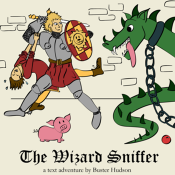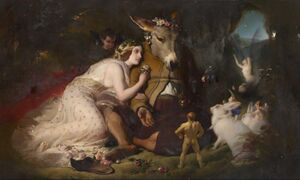Software:The Wizard Sniffer
| The Wizard Sniffer | |
|---|---|
 Cover art | |
| Developer(s) | Buster Hudson |
| Engine | Inform 7 |
| Release | 1 October 2017 |
| Genre(s) | fantasy, comedy |
| Mode(s) | single-player |
The Wizard Sniffer is a 2017 interactive fiction fantasy comedy game by Buster Hudson.[1]
The Wizard Sniffer was Hudson's seventh game published in the Interactive Fiction Database (IFDB) and is, as of 2023, his latest game, not counting Cragne Manor (2018)[2] which has 84 collaborating authors.
Plot
– The pig, The Wizard Sniffer by Buster Hudson, from the introduction.
The player controls a pig who has been acquired by the knight Ser Leonhart and his squire Tuck who believes the pig is able to recognize wizards by their smell.[1] The trio searches for a shapeshifting wizard[1] in a fortress guarded by a playful dragon.
Early in the game it pokes fun at old puzzle tropes found festering in a rubbish bin beneath a cloud of flies: "a stack of discs with three wooden rods on a stand", "a sliding set of tiles numbered one through fifteen", "a scale with many coins", "a pair of jugs (one 5-pint and one 3-pint)", "several heavy blocks and pressure plates", and "a book of riddles".
The hint system consists of two fleas below the pig's ear which drop clues where one clue is true and one clue is false.[1]
Development and form
The game is a "limited parser", meaning that the list of action is short and defined.[3]
Hudson said that a character connected to a puzzle might once have acted more as a key or a door rather than a fully developed person, but that puzzles now instead exist because of the people, and that the puzzles help the player spend time with the characters.[3]
The game was developed in Inform 7 and is Freeware.[1]
Reception



Sarah Laskow wrote about The Wizard Sniffer in Atlas Obscura and described it as a slapstick comedy of errors, with bumbling heroes, marriages of convenience, and affectionate monsters guarding surprising secrets. She wrote that as parser game go, it was welcoming to newcomers. The text also contained a brief interview with Hudson about the game.[3]
Lynda Clark called the game a wonderful comedic game in the vein of Terry Pratchett or Douglas Adams. She was particularly impressed by the characterization of the pig's companions Ser Leonhart and Tuck, and how their bumbling idiocy was not only funny but also that any frustrations due to player or parser inadequacy was instead directed at them, rather than the game itself. She wrote that "the hint system is ingeniously gamified in a way which fits the tone of the game".[5]
In the top review for the game at Interactive Fiction Database (IFDB), game designer Chandler Groover praised Hudson for the clever puzzles and for further improving on the hint systems from Hudson's earlier games Oppositely Opal (2015) and Foo Foo (2016) and here rising it to the next level in which it became its own puzzle. Groover wrote "Players don't feel like they had to give up by using it. Instead, they're rewarded with more jokes, more characters, more story." and "[The fleas'] influence permeates the game, allows it to sprawl as much as it does." Groover wrote about the plot that "This isn't just a silly story about transformative magic: it's a story about how identities transform too, and how they sometimes don't, and sometimes should, and sometimes shouldn't." Groover noted that other reviewers had compared the game to Monty Python and the Holy Grail, but suggested some elements could be compared to Shakespeare's play A Midsummer Night's Dream. Groover also suggested that some drawbacks of the game were long prose passages and some pop culture jokes that he feared would date the text and make it less timeless.[4]
Mike Spivey wrote that "Writing farce is like a figure skater launching into a spin: It’s easy to overdo it or underdo it [...] The Wizard Sniffer nails it, though, in a spiraling cascade of zaniness".[4] He praised the game for clever and well-integrated puzzles as well as the pacing. He appreciated how Hudson avoided going for laughs within the text and instead allowing humor arising from the discrepancy between the crazy action and the straight man descriptions of it. He wrote that the game reminded him of a 1930s screwball comedy or a classic Looney Tunes cartoon, and ended the review with "I've never laughed so much playing an IF game."[4]
Hanon Ondricek called it a stellar follow up to Hudson's game Oppositely Opal.
Awards and regognition
The game won five awards in the 2017 XYZZY Awards: "Best game", "Best story", "Best NPCs", "Best individual puzzle" (Getting past the dragon), and "Best individual NPC" (Squire Tuck). It was also nominated in the category "Best Puzzles", but lost to The Wand by Arthur DiBianca.[1]
The game won two awards in the 2017 Interactive Fiction Competition: 1st place overall and 1st place Miss Congeniality Award.[1]
The game is (2023) listed as the #8 game in the IFDB Top 100,[6] and was voted #10 (tie) top Interactive Fiction of All Time in a September 2023 vote among members.[7]
See also
- LGBT themes in video games
- List of video games with LGBT characters
References
- ↑ 1.0 1.1 1.2 1.3 1.4 1.5 1.6 "The Wizard Sniffer" at the Interactive Fiction Database.
- ↑ "Results for author:Buster Hudson", ifdb.org.
- ↑ 3.0 3.1 3.2 Sarah Laskow. "Welcome to Interactive Fiction: You're a Wizard-Sniffing Pig", Atlas Obscura, 1 December 2017.
- ↑ 4.0 4.1 4.2 4.3 "The Wizard Sniffer (All reviews)" at the Interactive Fiction Database.
- ↑ Lynda Clark. "Sniffing Wizards", medium.com, 17 December 2017.
- ↑ "IFDB Top 100" (archived), ifdb.org, 13 November 2023.
- ↑ "Interactive Fiction Top 50 of All Time (2023 edition)", ifdb.org, 15 September 2023.
External links
- "The Wizard Sniffer" at the Interactive Fiction Database
- "The Wizard Sniffer" at TV Tropes
